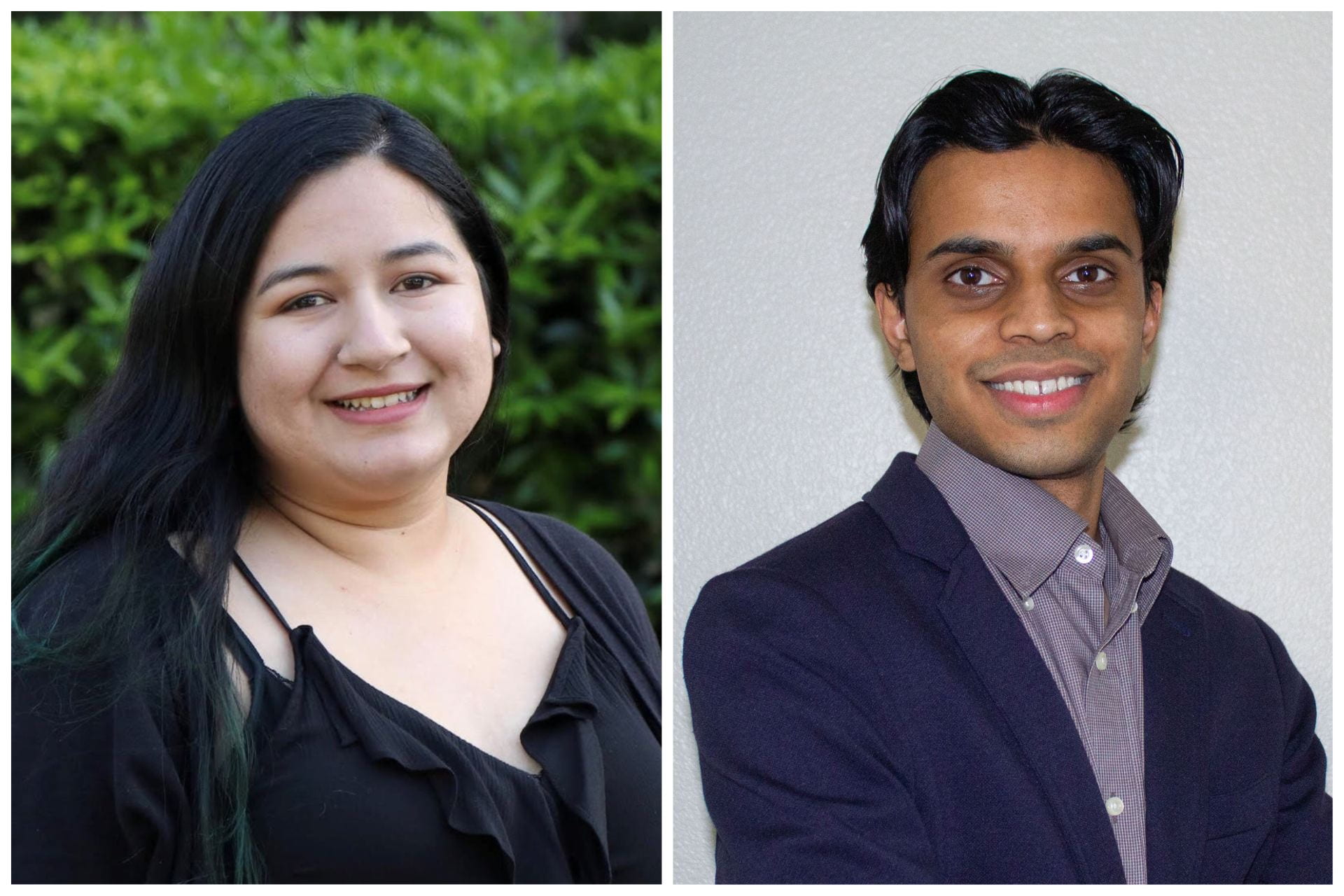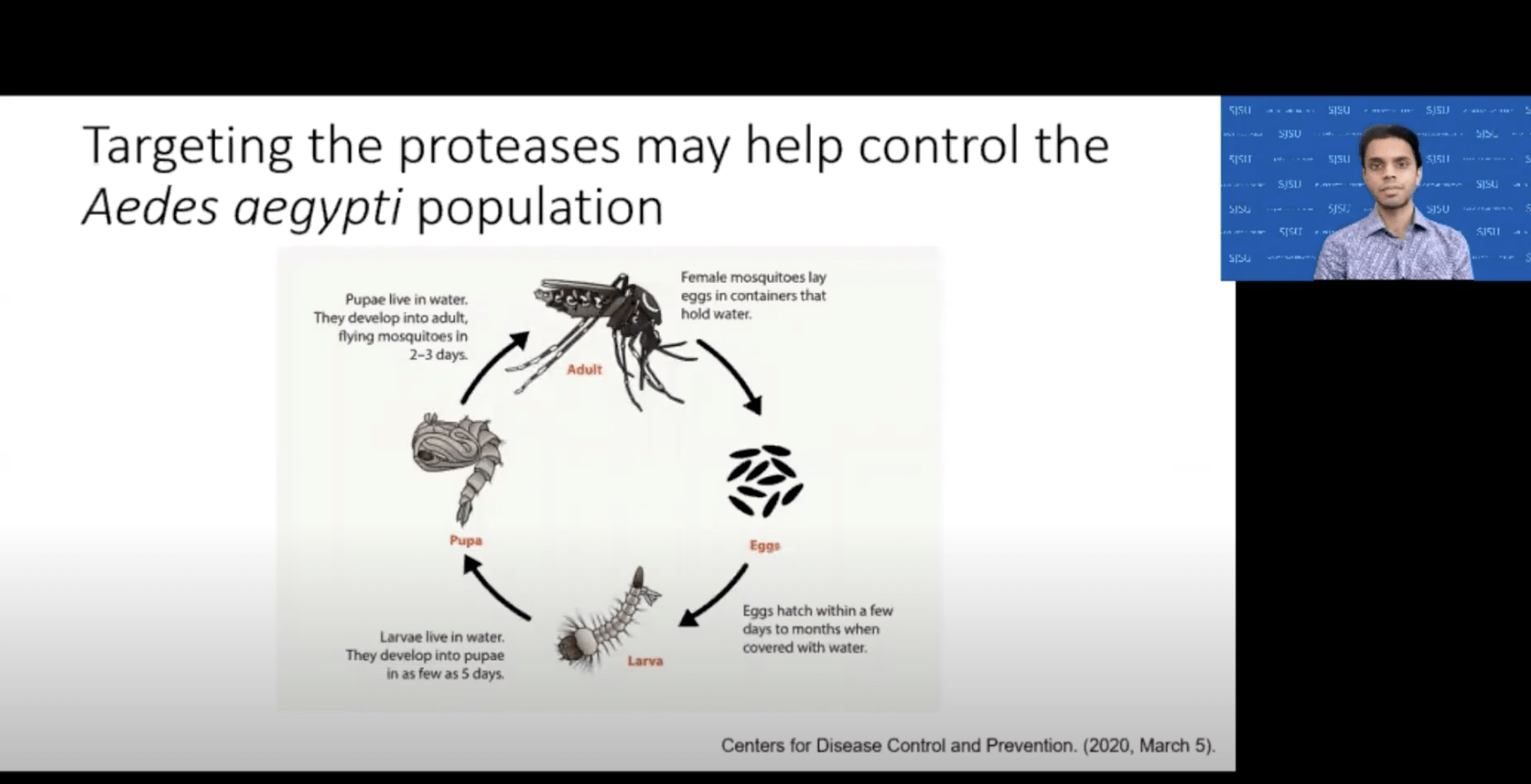
(From L-R): Lupe Franco, ’21 MS Environmental Studies, received the Audience Choice Award at the CSU Grad Slam. Muhammad Khan, ’22 Biological Sciences, won first place in the Biological and Agricultural Sciences Undergraduate category at the 35th Annual CSU Student Research Competition.
Turning months — even years — of in-depth research into a concise, engaging presentation isn’t easy. Yet two San José State students were triumphant at two recent California State University system-wide competitions that required them to do just that.
Lupe Franco, ‘21 MS Environmental Studies, received the Audience Choice Award at the first-ever CSU Grad Slam on May 6, which was hosted by San José State.
Her research analyzed how California cities and counties are considering homeless populations in their plans to address the effects of climate change. Franco placed first in the SJSU Grad Slam, held April 29 during the university’s annual Celebration of Research event.
Muhammad Khan, ‘22 Biological Sciences, earned first place in the Biological and Agricultural Sciences Undergraduate category at the 35th Annual CSU Student Research Competition — hosted by Cal Poly Pomona on April 30 and May 1. Khan presented his research on population control of a mosquito known for spreading diseases such as Zika, Dengue fever and yellow fever.
In the CSU Grad Slam competition, graduate students condensed the theses of their research projects into three-minute presentations to be understandable by a lay audience. Prizes are awarded based on the success of their presentation, and the Audience Choice Award is selected live by the attendees of the event.
At the CSU Student Research Competition, both graduate and undergraduate students present their research through pre-recorded videos followed by a live Q&A with a jury and an audience. The event is held to recognize outstanding accomplishments from students throughout the CSU system.
Giving a voice to a vulnerable population

In her presentation (shown here at the SJSU Grad Slam), Franco included a painting by student artist Gina Geissinger of Greg Tarola, a homeless man who died on the streets of Sacramento.
Franco began her presentation with the story of Greg Tarola, a homeless man who was found dead on the Sacramento streets in November. It was 37 degrees Fahrenheit the morning he was found, and his blankets were wet from the previous night’s rain.
What’s more, Tarola had told CapRadio News just days before that he had never heard of warming stations in Sacramento.
“This is the reality for over 150,000 Californians who are experiencing houselessness, of which 68 percent are considered unsheltered,” Franco said in her presentation.
“This danger is only going to increase as climate change brings California more frequent and intense weather events, such as heat waves and floodings.”
Franco analyzed 15 climate action plans from cities and counties in California with the largest unhoused populations to understand how they were considering that demographic in their strategies to address climate change.
Her findings? No jurisdictions had met with unhoused populations before developing their plans.
“This is what researchers call the power of representation dilemma, meaning that as outsiders, planners can only make assumptions of what the community faces, which leads to the development of strategies that do not accurately reflect what the local needs are,” she explained.
Franco’s research provided an analysis of the 15 plans, and she provided a list of recommendations that the cities and counties can consider as they continue to update their plans, such as “requiring planners to have on-the-ground training with local organizations in their jurisdictions, so they can learn about important street-level issues.”
Costanza Rampini, assistant professor of environmental studies and Franco’s thesis advisor, said that Franco is tackling issues most people see as completely separate.
“Her work speaks to people’s desire for better solutions, for better systems, for better communities,” she said. “Lupe is a fantastic researcher and asks all the right questions.”
Marc d’Alarcao, dean of the College of Graduate Studies, agreed.
“Lupe effectively engaged the audience by presenting her work through the lens of the tragic story of an unhoused man in Sacramento who suffered because the policies that could have helped him were not designed with his circumstances in mind,” he said.
Franco plans to continue her research and interview unhoused individuals to better understand their needs as she pursues a PhD in geography from UC Davis. She’s hopeful her research can make an impact on local communities.
“With these findings and recommendations, my research can spark the initial conversation about creating equitable and just strategies that give unhoused individuals a voice and access to critical resources,” she noted. “This is what Greg Tarola deserved.”
Watch the full CSU Grad Slam event, including Franco’s presentation, here.
A new approach to mitigating disease spread

Khan’s research explores population control of the Aedes aegypti mosquito through mutagenesis and recombinant expression.
Khan researched mutagenesis and recombinant expression in the Aedes aegypti mosquito — known for spreading potentially lethal diseases like Zika, Dengue fever, yellow fever and chikungunya — in hopes of providing a safe, new approach to control their population.
“Studying the midgut digestive enzymes of the Aedes aegypti mosquito is important locally and nationally because simulated models based on current climate data predict the expansion of mosquito ecological niches in the near future,” Khan said in his presentation.
He noted one study that estimates 390 million Dengue fever infections every year, while another found that 3.9 billion people worldwide are at risk of the disease. Current control strategies for mosquito larvae and adults include pesticides and biocides. But Khan said most of these treatments can have devastating effects on the environment.
Khan began his research through FIRES, the Freshmen Initiative: Research to Engage Students program sponsored by the W.M. Keck Foundation and led by a team of SJSU chemistry professors.
“We are very pleased to see Muhammad Khan winning a first place award at the 35th Annual CSU Student Research Competition,” said Mohamed Abousalem, vice president for research and innovation at SJSU.
“This is a great achievement and a testament to his capabilities and the sound guidance he received from his faculty mentor, Dr. Alberto Rascón, Jr. We hope that Muhammad will be encouraged by this recognition to embrace research as a way of thinking and doing throughout his career.”
Learn more about Khan’s research here.
James Nguyen contributed to this story.
